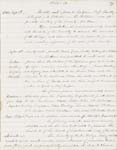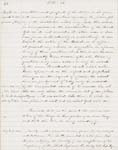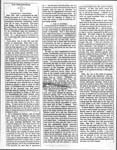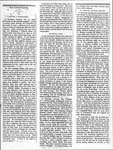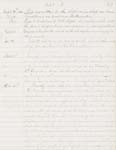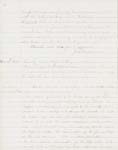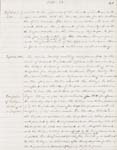Centre During the Age of Lincoln
Exhibition Designed by Anastasia Knight, Class of 2003
A Petition to Ormond Beatty, 1861
This petition was signed by mostly students, but also included the signature of Professor Robert Patterson.
 "We, the undersigned, believing from the present threatening appearances of our Commonwealth, and especially our vicinity, that we will, in all probability, soon be called out to preserve our own lives, and defend the homes of our childhood from the ruthless attack of an invading foe, do most earnestly invite and solicit you to accept of the captaincy of a company of which we shall form a part, that we may make some preparation for a war that may be force upon us in a few days. We do not wish to break up the College, but pledge ourselves to remain until dismissed by the faculty. Thinking it more than probable that we will eventually be forced to take up arms in defense of our country, and preferring as far as possible to select our own immediate associates and messmates, we have early solicited your services, knowing that you will make a Christian, patriotic and competent leader, who can do very much towards shielding us from the demoralizing influence of our war and camp life."
"We, the undersigned, believing from the present threatening appearances of our Commonwealth, and especially our vicinity, that we will, in all probability, soon be called out to preserve our own lives, and defend the homes of our childhood from the ruthless attack of an invading foe, do most earnestly invite and solicit you to accept of the captaincy of a company of which we shall form a part, that we may make some preparation for a war that may be force upon us in a few days. We do not wish to break up the College, but pledge ourselves to remain until dismissed by the faculty. Thinking it more than probable that we will eventually be forced to take up arms in defense of our country, and preferring as far as possible to select our own immediate associates and messmates, we have early solicited your services, knowing that you will make a Christian, patriotic and competent leader, who can do very much towards shielding us from the demoralizing influence of our war and camp life."
Faculty Minutes, September 10, 1862
"The Faculty of Centre College, being called to meet under circumstances of peculiar trial and responsibility, consider it due to themselves to place on the minutes the following expression of their views.
First. We distinctly recognize the Board of Trustees as, in the highest sense, the appointed guardians of the College, and earnestly request the President of the Board to call a meeting of that body on the earliest practicable occasion, in the exercise of his own wise discretion.
Secondly. Until such meeting can be held, the responsibility for the welfare of the Institution is in the Providence of God, devolved upon the Faculty. We feel that this is a very grave and solemn responsibility, yet it is one which we cannot honorably decline or evade. We meet it calmly, in the fear of God, who has cast it upon us.
Thirdly. It is our deliberate judgment that to abandon our posts, or suspend the operations of the College, in the present crisis would be disastrous in at least two respects. It would increase to an indefinite extent the difficulty of collecting our students and reopening the College, when these disastrous times shall have passed away. And it would probably jeopard the pecuniary interests of the Institution in the funds recently subscribed for the endowment of the College.
Fourthly. We cherish the abiding hope that the God of our Fathers will grant us, at no distant period, a deliverance from these calamities, and believe that when this shall be accomplished, a goodly number of our students will return, if the doors are found open and the classes regularly organized.
Fifthly. No fear of adverse or unfriendly judgment can lead us, for a moment, to falter in the performance of a clear and imperative duty; yet, to avoid all possible misconstruction of our course, we do hereby deliberately renounce all legal claim for the salaries promised us by the Board from and after the 8th day of September, 1862, and until a meeting of the Board can be held or the necessities of the Professors shall compel them to seek other employment; leaving the whole question of compensation for our services to the Board itself, and with the full assurance that in regard to each one of us individually, their decision will be guided by impartial equity, and in reference to the Institution by a wise and sagacious consideration of all the circumstances of the case.
Sixthly. It would be folly to close our eyes against the altered circumstances of the country or the correspondent changes in the condition and prospects of the College, or the grave and momentous questions regarding the future policy of the Institution which may force themselves, in consequence, on the consideration of the Board. Yet we do not consider it either wise or decorous for us, individually or collectively, to anticipate the action of the Board, or to offer, at present, any advice or suggestion in reference to any of these questions. And this is all the more preeminently true, because, after all, those questions may never arise or may be solved by the same Providential events which call them up; and in the rapid and perpetual changes in the aspect of affairs, the wisest human judgment of today may be reversed by the unexpected events of tomorrow. In all this we only share the common lot of our fellow citizens, and are called, like them, to abide in our place, and wait and see what God will do."
War Reminiscences By E.B.P
Elizabeth Patterson was the wife of Professor Robert Patterson. In her journal, published much later in an unknown newspaper, she chronicled not only her wartime experiences in Danville and on the Centre campus, but also recounted the Home Guard experiences of her husband. The following are some excerpts.
July 11, 1862
"For some time past the quiet, conservative and intellectual population of our little town of Danville, Kentucky, has been thrown into a state of the wildest excitement by a constant succession of rumors that the border State of Kentucky was on the eve of being compelled to abandon her position of strict neutrality and taken sides either for or against the Union. The government has sent arms to be distributed among the Union men throughout the State, and a Union camp has been established about seven miles from us called Camp Dick Robinson."
"I am filled with dread at these rumors, as I do not know what will become of us should Kentucky once more become the 'Dark and Bloody Ground,' as in days of your. Gov. Magoffin [Beriah Magoffin, class of 1834] has been suspected of entertaining traitorous designs, and working in an underhanded way to carry the State out of the Union. I think he has been misunderstood and misrepresented, simply because he does not appear to be carried away by the zeal with which some of the Unionists are animated -- being only cautious and conservative. Civil war should have been the last resort, and the “pity of it is” we have had so few true Statesmen to guide us."
July 12, 1862
"...Our citizens were fully persuaded that as Danville was quite famous for its strong Union sentiments freely expressed, Morgan would certainly give it call, and aided by the Secessionists, would doubtless visit the houses of the Unionists and pour out upon them the vials of [illegible word] wrath."
..."Hon. Joshua Bell, one of Danville's most prominent lawyers, and a strong Union man, made a speech at the court house, encouraging the citizens to make a brave defense, and requesting all who were Unionists to come at 3 P.M. at the tap of the drum ... armed, and with provisions enough for one day...."
"...[Robert] had joined a company of 'Home Guards,' consisting of about fifty Union men who had resolved to do something or die in defense of their country!"
September 3, 1862
"Wednesday, Sept. 3, Morgan made his long expected entrance into Danville with a cavalry force of 1500... It was but a few hours after his arrival, while we were seated at the dinner table in blissful ignorance of any impending danger awaiting us especially, we were startled by a loud knock at the door.I bade Ann, who was waiting on table, go see who was there; but scarcely had she gone to answer the summons, when I was seized with a fearful apprehension of some approaching evil, and begged [Robert] to make his escape by the door that opened into the yard and fly for safety to the woods before it was too late. But I pleaded in vain. He could not understand why I should connect the knock at our door with Morgan, who had just reached town and could not have had time to enquire about Union men ..."
"While I was still urging and imploring him to fly, Ann entered the dining room through the door that opened into [Robert's] study, and there close behind her stood three Confederate soldiers, one of whom stepped to the front and very politely requested the pleasure of [Robert's] company for a few moments.... They expressed themselves as being very sorry, but they had been sent by Col. Morgan to arrest [Robert]."
"...[Robert] was taken to the hotel where the Confederates had their headquarters.... Morgan inquired of [Robert] what state he was from, and received the reply that he was a native of Pennsylvania. … After some consultation with his associates, Morgan proposed that [Robert] should swear allegiance to the Southern Confederacy, and finding this proposition indignantly refused, he ordered him to be placed under guard and kept carefully confined in an upper chamber of the hotel."
"...I will copy the parole given [Robert] by Col. Grigsby, and received through the Post Office by him Wednesday, September 10, four days after his release:"
September 10, 1862
"By virtue of authority of Maj. Gen. Smith, C.S.A., I have this day paroled Mr. [Robert Patterson], of Boyle Co. (Home Guard), upon his pledge of honor not to take up arms against the Confederate States of America, or in any way afford aid or comfort by giving information or otherwise to the enemy of said States, while within the Confederate lines.
J. Warren Grigsby, Col. C.S.A"
"...On Wednesday, Oct. 8th, [the Home Guard] visited a Knob that rises abruptly from the lower country, and from this elevation witnessed the battle of Perryville, at a distance of about ten miles from the severest of the fight, though part of the conflict was about seven miles from their outlook. At such distance they could only see the smoke from the guns and bursting shells, the dust arising from the evolutions of the cavalry as they supposed, and hear the reports of the artillery and thundering of musketry. They could tell nothing of what was really passing upon the field of battle and could distinguish neither man nor horse..."
1863
"Time passed on. Things were just about assuming their normal condition, the churches being again used for the exercise of worship, the college building re-occupied for the customary educational purposes, although the students were few in number and the congregations not overflowing."
Faculty Minutes
December 2, 1861
"Faculty met. All the members present. The Faculty were informed that the position of chaplain in Col. Landram's regiment of Kentucky volunteers had been offered to Prof. Matthews, & that he, in order to lighten for the time the pressure on the finances of the College, was inclined to accept the post. That the President of the Board of Trustees & some of the members had been consulted and they saw no objection to granting him leave of absence for a time, provided arrangements could be made for instruction in his department by the other professors. Prof. Cooper expressed his strong desire to go instead of Prof. Matthews on account of his freedom from family ties & earnest wish to enter the Army at any rate. Whereupon it was resolved that in case either of these brethren obtain leave of absence from the Board of Trustees, the remaining Professor will cheerfully render any additional service necessary in order to supply instruction in the vacant department."
September 18, 1862
"Faculty met; present Messrs. Green, Beatty, McKnight and Patterson. Prof. Beatty presented a letter from Prof. Cooper, notifying the Faculty of his acceptance of the Chaplaincy of the Third Regiment, Kentucky, Vol. Infantry, subject to the approval of the Board of Trustees, and upon condition that the Faculty provide for the instruction of his classes. After some consultation, it was resolved that in the judgment of the Faculty, it will be impracticable, in the absence of Prof. Cooper, to provide for instruction in the Modern Languages; and the consideration of the instruction of the Sophomore & Freshman classes in Greek was postponed until our next meeting."
September 26, 1862
"The regular Faculty meeting was prevented by the visit of several Confederate officers, who examined the College building with a view to making it a hospital for Confederate soldiers. Profs. Beatty, McKnight, & Patterson, at an informal meeting, concurred in the opinion that should the College be thus occupied, we should, if Dr. Green concur, endeavor still to hear the recitations of the classes, using the Sayre Library as far as practicable for that purpose. On Saturday, September 27, 1862, the College was taken possession of by the Confederate forces for hospital purposes, with the exception of Prof. Beatty's rooms. On Monday, October 13th, the Confederate soldiers in the hospital are taken prisoners and paroled by the U.S. forces; and on Thursday, October 16th, the Confederate sick are removed to the Baptist Church, and the College building is occupied by U.S. soldiers as a hospital. On February 27th, evacuated by the sick; and on March 14th, the building is restored to the College authorities after twenty day's occupation by the Confederates and 5 months, less 2 days, by the U.S. forces."
September 29, 1862
"Monday. Commence using the Sayre Library for Chapel exercises and recitations."
October 3, 1862
"Faculty met: present Messrs. Green, Beatty, McKnight & Patterson. Prof. Patterson notifies the Faculty of his expected absence on account of fears of the operation of the Confederate conscription."
October 9, 1862
"There being but six students present, and the community intensely excited on account of the battle of yesterday (at Perryville), the Faculty, present Messrs. Green, Beatty, and McKnight, resolve to suspend exercises until Monday next."
October 13, 1862
"Monday. Faculty met: present Messrs. Green, Beatty, McKnight, & Patterson; but six students appearing, and both armies being in our immediate vicinity, it was resolved to suspend exercises until Monday next."
October 17, 1862
"Faculty met at the office of the Financial Agent: present Messrs. Green, Beatty, & Patterson. At the suggestion of Rev. Dr. Humphrey & Hon. Joshua F. Bell, it was resolved to suspend the exercises of the College for another week."
October 27, 1862
"Monday. College re-opened, but the classes excused for today, the stoves not being in readiness. Have thus lost, in all, thirteen days of College exercises."
October 28, 1862
"Exercises resumed; 17 students present. Faculty met after recitations; no business transacted."
